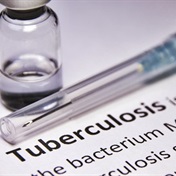Immediately treating both tuberculosis and the Aids virus works best among patients whose immune systems have suffered the most damage from HIV, according to three studies appearing this week in the New England Journal of Medicine.
Although two of the three tests concluded that quickly adding anti-HIV drugs to TB treatment did not produce a significant benefit, Dr Richard Chaisson, a tuberculosis specialist at Johns Hopkins University in Baltimore, said earlier data consistently point to early therapy for HIV once TB drug therapy has begun.
"They all give the message to treat early. And with patients with very advanced Aids, treat immediately," said Dr Chaisson, who was not involved with any of the new studies. "With less advanced Aids, it's okay to wait a little bit longer, but it's better to start earlier rather than much later."
TB biggest killer
In developing countries, tuberculosis is the most frequent cause of death among HIV-infected patients.
Doctors have been hesitant about simultaneous treatment for several reasons: it involves a lot of pills, the drugs can interact or have overlapping side effects, or the immune system, as it becomes stronger from anti-HIV therapy, may overreact to TB, causing the potentially-fatal immune reconstitution inflammatory syndrome.
But without HIV therapy, about 30% of people with both conditions die within two months after the start of TB treatment.
In 2010, a study led by Dr Salim Abdool Karim of the University of KwaZulu-Natal in South Africa found that waiting to start HIV treatment until after TB therapy was completed led to a higher risk of death. As a result, doctors starting adding HIV therapy four to eight weeks into TB treatment.
Little difference
The three studies released online in the New England Journal were designed to see if earlier HIV treatment, starting two to four weeks into TB therapy, would work even better.
One study in 429 patients, again led by Dr Karim, found little difference in the combined endpoint of Aids or death if treatment was given within four weeks of the start of TB therapy, or beyond that point (i.e., after the end of the intensive phase of TB treatment, which lasted two or three months). The rate was roughly 7% to 8% either way.
But among patients with the most-suppressed immune systems – CD4+ T-cell counts of less than 50/mm3 – the rate of the combined endpoint was 8.5% for early treatment versus 26.3% when therapy started later (P=0.06).
The same pattern was seen in the second study, led by Dr Diane Havlir of the University of California, San Francisco. In the 809-person trial, earlier HIV therapy (within two weeks of starting TB therapy) produced no significant improvement, unless the CD4+ cell count was less than 50. Then, 15.5% in the early HIV-treatment group died or had a new Aids-defining illness after 48 weeks, compared to 26.6% who got HIV therapy between eight and 12 weeks after TB treatment began (P=0.02).
Inflammatory syndrome
The third study, known as CAMELIA and led by Dr Francois-Xavier Blanc of the University Hospital Centre (CHU) of Kremlin-Bicetre in France, found an 18% mortality rate when HIV therapy began two weeks after the start of TB treatment, versus a rate of 27% when the therapy was started after eight weeks of TB therapy (P=0.006). That study, done in Cambodia, included patients who tended to have lower CD4+ counts.
Early treatment had a key drawback: a higher risk of immune reconstitution inflammatory syndrome. The rate more than doubled among patients receiving early HIV treatment.
With treatment, the immune system regains the ability to fight back against infection. "So it does, and sometimes it fights back too aggressively. They'll get big swelling of the lymph nodes or their pneumonia gets worse," Dr Chaisson told Reuters Health in a telephone interview.
If the TB is in the brain, he added, you can get swelling of the brain and that can be fatal. The immune system is fighting back, but sometimes it's overdoing it.
Site of disease important
In an editorial, Drs Estee Torok of the University of Cambridge and Jeremy Farrar of the Wellcome Trust Major Overseas Program in Ho Chi Minh City, Vietnam wrote, "The results of these three trials provide important evidence to guide clinicians who are treating patients with HIV-associated tuberculosis."
Patients whose immune systems are most crippled are the best candidates for the earliest HIV treatment, they said, but preferably if they have lung tuberculosis, where immune reconstitution inflammatory syndrome is less likely to be fatal.
So the best time to start treating HIV in people with TB may depend not only on the degree of immunosuppression but also on the site of disease, they said.
Just treat everybody
Dr Chaisson said the World Health Organization changed its policies last year, partly based on data from these studies.
Now, he said, "They recommend starting treatment immediately for everybody, because it can be difficult in some countries to get CD4+ counts.
"Just treat everybody and everybody will benefit. That's a very practical approach," Dr Chaisson said.
(Reuters Health, October 2011)
Read more:




 Publications
Publications
 Partners
Partners














